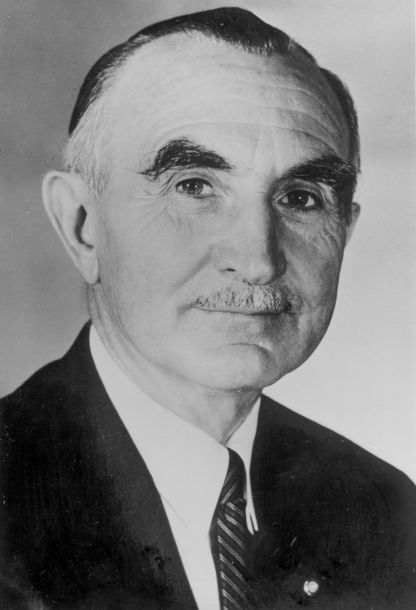Wayne Morse
Wayne Lyman Morse (October 20, 1900 – July 22, 1974) was an American attorney and United States Senator from Oregon. Morse is well known for opposing the Democratic Party’s leadership and for his opposition to the Vietnam War on constitutional grounds.Born in Madison, Wisconsin, and educated at the University of Wisconsin and the University of Minnesota Law School, Morse moved to Oregon in 1930 and began teaching at the University of Oregon School of Law. During World War II, he was elected to the U.S. Senate as a Republican; he became an Independent after Dwight D. Eisenhower's election to the presidency in 1952. While an independent, he set a record for performing the third-longest one-person filibuster in the history of the Senate. Morse joined the Democratic Party in February 1955, and was reelected twice while a member of that party. Morse made a brief run for the Democratic Party's presidential nomination in 1960. In 1964, Morse was one of two senators to oppose the later-to-become-controversial Gulf of Tonkin Resolution. It authorized the president to take military action in Vietnam without a declaration of war. He continued to speak out against the war in the ensuing years, and lost his 1968 bid for reelection to Bob Packwood, who criticized his strong opposition to the war. Morse made two more bids for reelection to the Senate before his death in 1974. (Wikipedia)
- name
- Family Name
- Given Name
- Birth Date
- Death Date
- Nationality
- Job Title
- Is Referenced By
- Description
-
Wayne Morse
-
Morse
-
Wayne
-
1900
-
1974
-
American
-
Senator
-
Wayne Lyman Morse (October 20, 1900 – July 22, 1974) was an American attorney and United States Senator from Oregon. Morse is well known for opposing the Democratic Party’s leadership and for his opposition to the Vietnam War on constitutional grounds.Born in Madison, Wisconsin, and educated at the University of Wisconsin and the University of Minnesota Law School, Morse moved to Oregon in 1930 and began teaching at the University of Oregon School of Law. During World War II, he was elected to the U.S. Senate as a Republican; he became an Independent after Dwight D. Eisenhower's election to the presidency in 1952. While an independent, he set a record for performing the third-longest one-person filibuster in the history of the Senate. Morse joined the Democratic Party in February 1955, and was reelected twice while a member of that party. Morse made a brief run for the Democratic Party's presidential nomination in 1960. In 1964, Morse was one of two senators to oppose the later-to-become-controversial Gulf of Tonkin Resolution. It authorized the president to take military action in Vietnam without a declaration of war. He continued to speak out against the war in the ensuing years, and lost his 1968 bid for reelection to Bob Packwood, who criticized his strong opposition to the war. Morse made two more bids for reelection to the Senate before his death in 1974. (Wikipedia)
Linked resources
| Title | Class |
|---|---|
| America Since the Bomb: The Moon or South-East Asia | CreativeWork |

